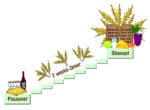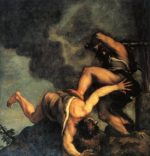
Sefirat HaOmer—A Study in Klal u’Prat
The forty-nine days between Passover and Shavuot are called the days of Sefira or the days of counting Omer—Sefirat HaOmer—when Jews count every day as

The forty-nine days between Passover and Shavuot are called the days of Sefira or the days of counting Omer—Sefirat HaOmer—when Jews count every day as

This is the fourth installment in the series of essays on the nature of the soul. The first three installments can be found here: What

There is a Biblical Commandment to count the days between the Passover and Shavuot, the “Feast of Weeks” (a.k.a. Pentecost). We start counting on the

The Torah portion Vayakhel deals with the construction of the Mishkan, i.e., the “Tabernacle.” In Kabbalah, the Mishkan is viewed as a microcosm that represents

…And Abel was a keeper of sheep, but Cain was a tiller of the ground. And in process of time it came to pass, that Cain

Now the Serpent was more cunning than any beast of the field which the Eternal G‑d had made. (Genesis 3:1) When G‑d placed Adam

The Lord spoke to Moses, saying: Speak to the children of Israel and you shall say to them that they shall make for themselves fringes